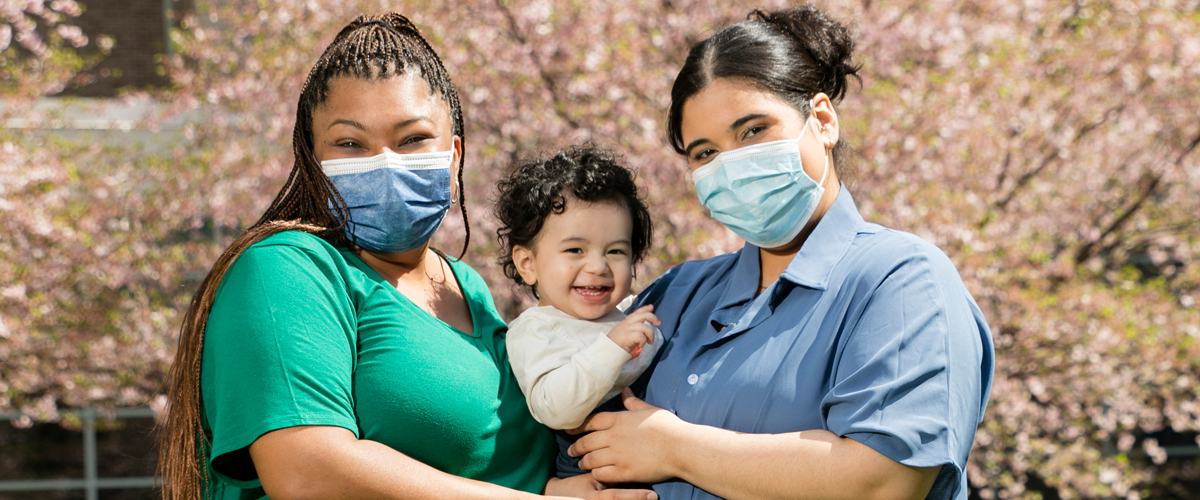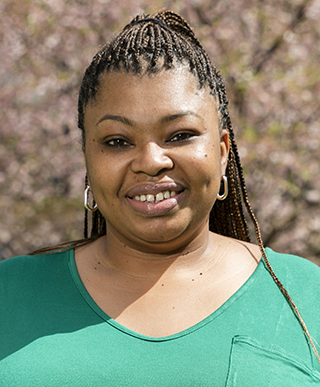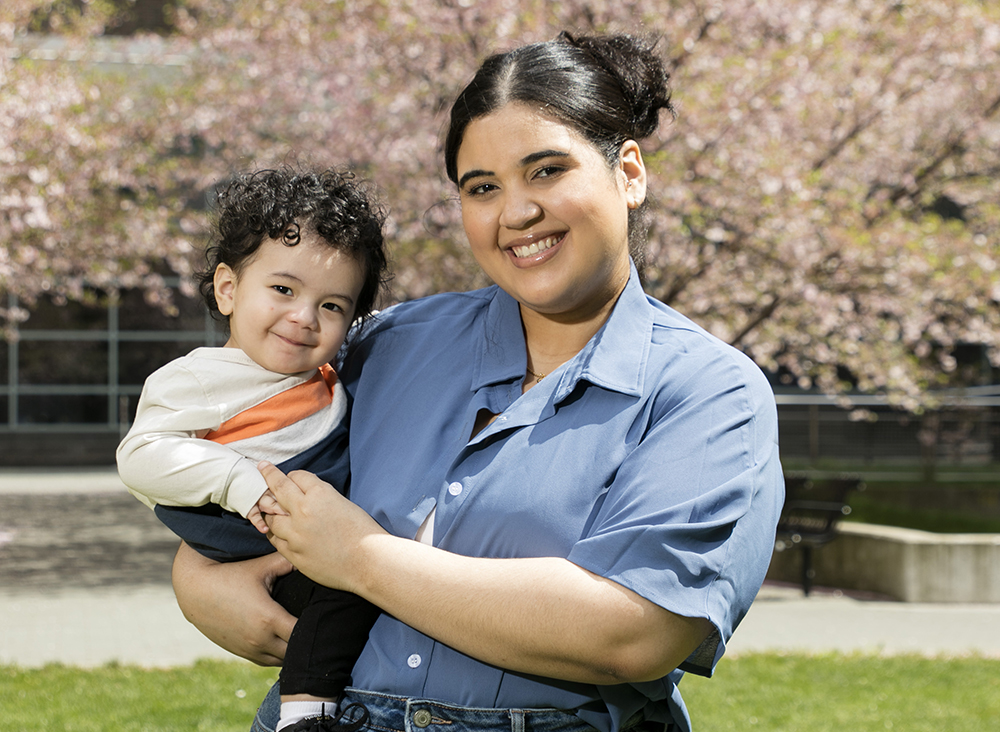Postpartum Doulas: Helping Mothers When the Baby Comes Home
A NewYork-Presbyterian program provides free doulas to support mothers during the critical weeks after childbirth.

Doula Sharonda Gardner, left, with Alondra Guaba and her son, Israel.
Kadia Paddy had a healthy pregnancy but still had concerns and fears about caring for her newborn after his birth in December 2021 at NewYork-Presbyterian Morgan Stanley Children’s Hospital.
So when Kadia heard about a doula program, offered by the hospital, where trained community peers support mothers in the weeks after childbirth, she asked to join.
“I had anxiety about caring for my baby, and I thought that someone who understands moms and babies could answer my questions and help me,” Kadia says.
Kadia was paired with a postpartum doula who held video chats with her once a week for six weeks. The doula gave Kadia advice on topics such as breastfeeding, nutrition, bathing and swaddling her baby, putting him to sleep safely, treating her c-section wound and knowing when to call her doctor if she experienced certain physical symptoms. The doula also encouraged Kadia to take a bit of time for herself each day.
“It helped me a lot to have someone to speak to about whatever concerns I had about my son or about how I felt,” Kadia says. “The doula gave me a lot of assurance and confidence in myself.”
Kadia was part of a NewYork-Presbyterian program called EMBRACE, which provides free postpartum doulas in the weeks after childbirth. EMBRACE launched as a pilot in July 2020 at NewYork-Presbyterian Allen Hospital and now is available at three additional campuses: NewYork-Presbyterian Morgan Stanley Children’s Hospital, NewYork-Presbyterian/Weill Cornell Medical Center, and NewYork-Presbyterian Brooklyn Methodist Hospital. Offered to patients who are income-eligible for Medicaid insurance, EMBRACE plans to serve 1,050 mothers from across New York City this year.
“If you don’t have anybody you can just call and say, ‘What does this mean? Is this something I should be concerned about?’ you’re going to feel lost,” says Kadia’s doula, Sharonda Gardner. “A postpartum doula is there to offer that comfort, guidance, and support to help you navigate those first few weeks of motherhood and help you be the best mom you can be. It’s really mothering the mother.”
EMBRACE works with community-based organizations that are deeply anchored in the community and that provide the doulas: the Caribbean Women’s Health Association in Brooklyn and the Northern Manhattan Perinatal Partnership (NMPP) in Manhattan, which also provides moms with community health workers. Sharonda became a doula five years ago with NMPP after she benefitted from one of their postpartum doulas when her second child was born.
“Doulas have been shown to improve health outcomes,” says Dr. Auja McDougale, medical director of the Women’s Health Practice and Community Health at NewYork-Presbyterian/Weill Cornell Medical Center and its EMBRACE clinical lead. “One of the most important components is that the doulas who are engaging with the patients are from the community and can relate. Their peer-to-peer support is a much-welcomed complement to the medical care we provide and makes the transition to postpartum recovery better.”
Reducing disparities in maternal health
Dr. Laura Riley, obstetrician and gynecologist-in-chief at NewYork-Presbyterian/Weill Cornell Medical Center, says doulas may help reduce disparities in maternal health. Black women are three times more likely than white women to die of a pregnancy-related cause in the United States, says the Centers for Disease Control and Prevention (CDC). In New York City, Black women are nine times more likely to die and their rate of infant mortality is more than three times higher, according to the New York City Mayor’s office.
“As we continue to struggle with racial disparities in maternal complications and deaths, we are looking for interventions that erase that disparity,” says Dr. Riley. “One area that we believe is very important is focusing on women who have little social support, which can adversely affect their pregnancies and postpartum recovery. This program allows us to partner with the community to provide these women with much-needed social support.”
A key goal of EMBRACE is to make sure participants attend their post-birth doctor’s appointment. As many as 40% of mothers don’t attend a postpartum visit, with rates climbing even higher for women with limited resources, according to the American College of Obstetricians and Gynecologists. The doulas encourage mothers to attend this important checkup; prepare them by suggesting that they write down questions and concerns; and remove barriers, like transportation needs, for getting to the appointment.
“Women with high-risk social needs will deliver and there’s really no support after the delivery, and then they drop off from the healthcare system,” says Dr. Riley. “We’re trying to help that population of patients stay engaged with the healthcare system so they return for their six-week visit and continue to stay engaged.”

Sharonda Gardner
The doulas also encourage mothers to advocate for themselves. Experts say it’s not uncommon for women of color to feel that they’re not being listened to when they raise medical concerns during pregnancy or after childbirth. Sharonda urges her clients to speak up and be persistent if something physically doesn’t feel right.
“Doulas understand that we are not medical professionals and we would never intervene that way,” Sharonda says. “But we do understand a lot about women’s bodies and the rights we women have and how important it is that our concerns be taken seriously.”
Comprehensive support
EMBRACE offers more than doulas. During their third trimester, the parent is encouraged to attend virtual classes on topics such as birth readiness, newborn care, and breastfeeding.
Clients also are screened for high-risk social factors like food insecurity, partner abuse, and a history of depression and are connected to services. The Manhattan EMBRACE program offers moms the opportunity to work with a community health worker up until the child’s first birthday, linking them to food, housing, and other assistance and scheduling medical appointments.
The Brooklyn EMBRACE program delivers a box of healthy food to the parent’s home twice a month for nine months.
In addition to the postpartum doulas, NewYork-Presbyterian Brooklyn Methodist Hospital has 10 doulas who support patients when they are in the hospital during labor and delivery and the days immediately after childbirth. These doulas, who are hospital employees, are available to both EMBRACE and other maternity patients. Also, two new doulas will start soon in the outpatient OB-GYN community practice to support patients during their prenatal doctor’s appointments. Altogether, a mother in the Brooklyn EMBRACE program could have continuous doula support before, during, and after childbirth.
“EMBRACE empowers people to attain autonomy over their pregnancy, birth, and breastfeeding experience through education and doula support,” says Dr. Danthanh Hoang, associate director of the neonatal intensive care unit (NICU) at NewYork-Presbyterian Brooklyn Methodist Hospital and its EMBRACE clinical lead. “Our approach is holistic and also addresses social factors that affect a mother’s health and access to healthcare and are particularly relevant to our EMBRACE patient population.”
While hiring doulas has become increasingly popular in the U.S., EMBRACE offers doulas to mothers who may not be able to afford one, notes Andy Nieto, senior director of NewYork-Presbyterian’s Division of Community and Population Health.
“EMBRACE increases access to doulas to mothers who need the support the most and also addresses systemic issues of health equity that affect communities of color,” Nieto says.
Like being with a friend
Alondra Guaba was connected to EMBRACE when her son, Israel, was three months old because she felt depressed and was struggling with new motherhood.
“There was a huge adjustment becoming a mom,” Alondra says. “It hit me really hard.”
Alondra says she had so many questions, and couldn’t sleep because she was constantly worried about potential problems like Sudden Infant Death Syndrome (SIDS). Alondra’s doctor recommended the doula program, and Alondra wanted to try it. Soon, Sharonda called, “and we hit it off right away.”

Alondra and Israel
“We spoke every week for an hour, and it was a great outlet for me because it was really hard dealing with depression and taking care of a baby,” Alondra says. “Sharonda was so knowledgeable about babies and postpartum bodies. I would ask her questions like what’s going on with me or my baby, and she would answer any question I had. She helped a lot with my anxiety.”
While Sharonda typically meets with a mother when they’re 36 weeks pregnant to discuss the birth plan and then starts weekly video visits right after childbirth, a mother can start EMBRACE later, if there’s a need.
With Sharonda’s encouragement, Alondra changed her diet and began eating healthier foods and exercising.
“I was just taking care of the baby and not myself,” Alondra says. “I learned a lot about self-care.”
In addition to practical advice, Sharonda provided a trusting relationship, sometimes simply asking Alondra what she had for dinner or was watching on TV. “It can feel so lonely when you are a new mom with a baby by yourself,” Alondra says. “Sometimes it was like being with a friend after a long day of being stressed out taking care of a baby.”
Dr. Devon Rupley, an OB-GYN at NewYork-Presbyterian/Columbia University Irving Medical Center and NewYork-Presbyterian Allen Hospital and a clinical lead of EMBRACE, says the doulas play an essential role in helping mothers navigate the physical and emotional challenges they face in the weeks after childbirth. “This program creates community support that’s focused on the mom’s needs as they transition through this critical period into their new role as a parent of a newborn,” she says.
Just having someone to talk to goes a long way in supporting a mother, Sharonda adds. “We know that we all need help,” she says. “My biggest role is to constantly reassure the moms. I let them know they can talk to me about anything because it’s judgment free. It makes a big difference if you just have someone there to offer you support and care that’s coming from a true and tender place.”
Additional Resources
Learn more about women’s health at NewYork-Presbyterian.
Read more about pregnancy on Health Matters.
